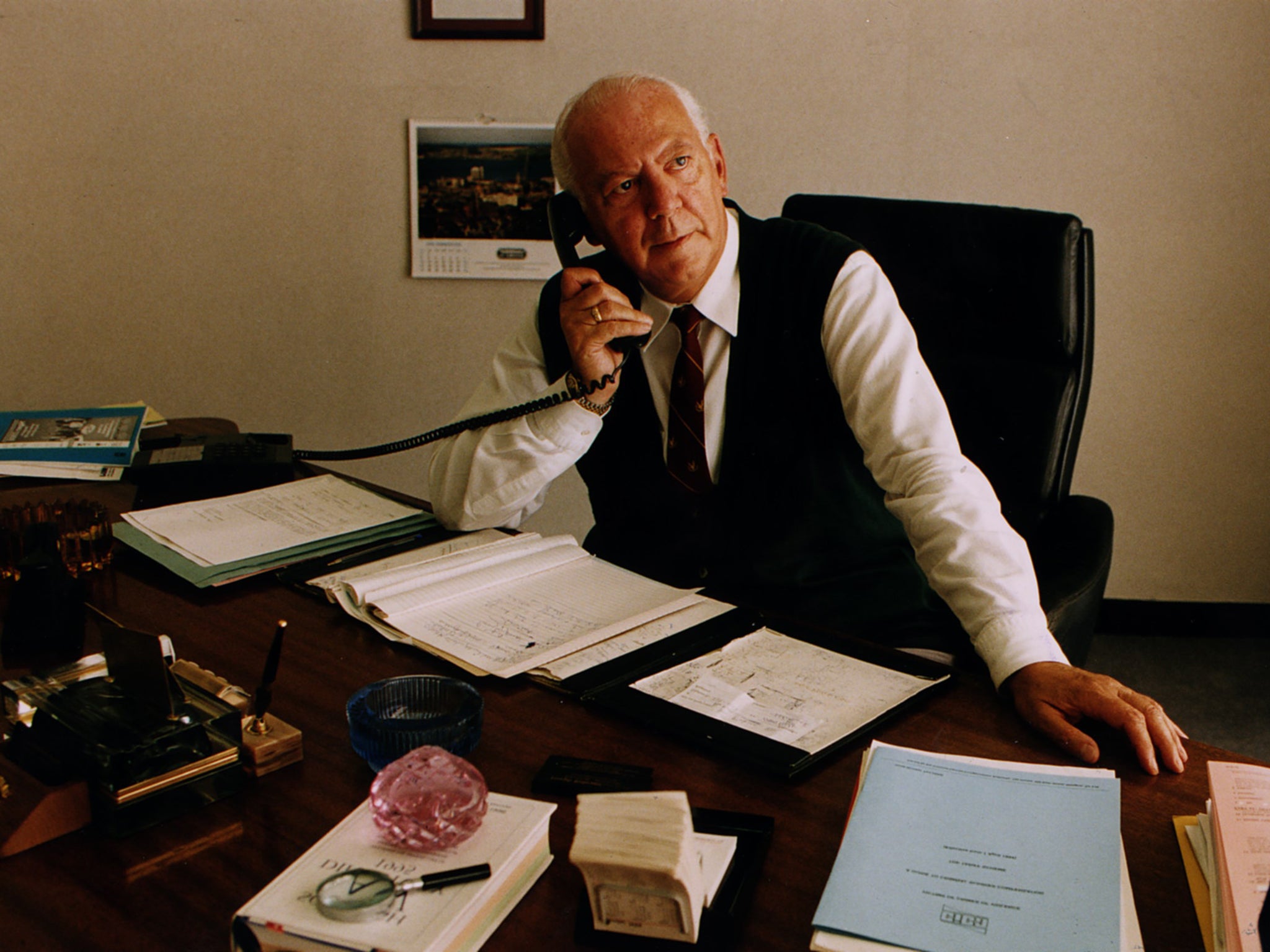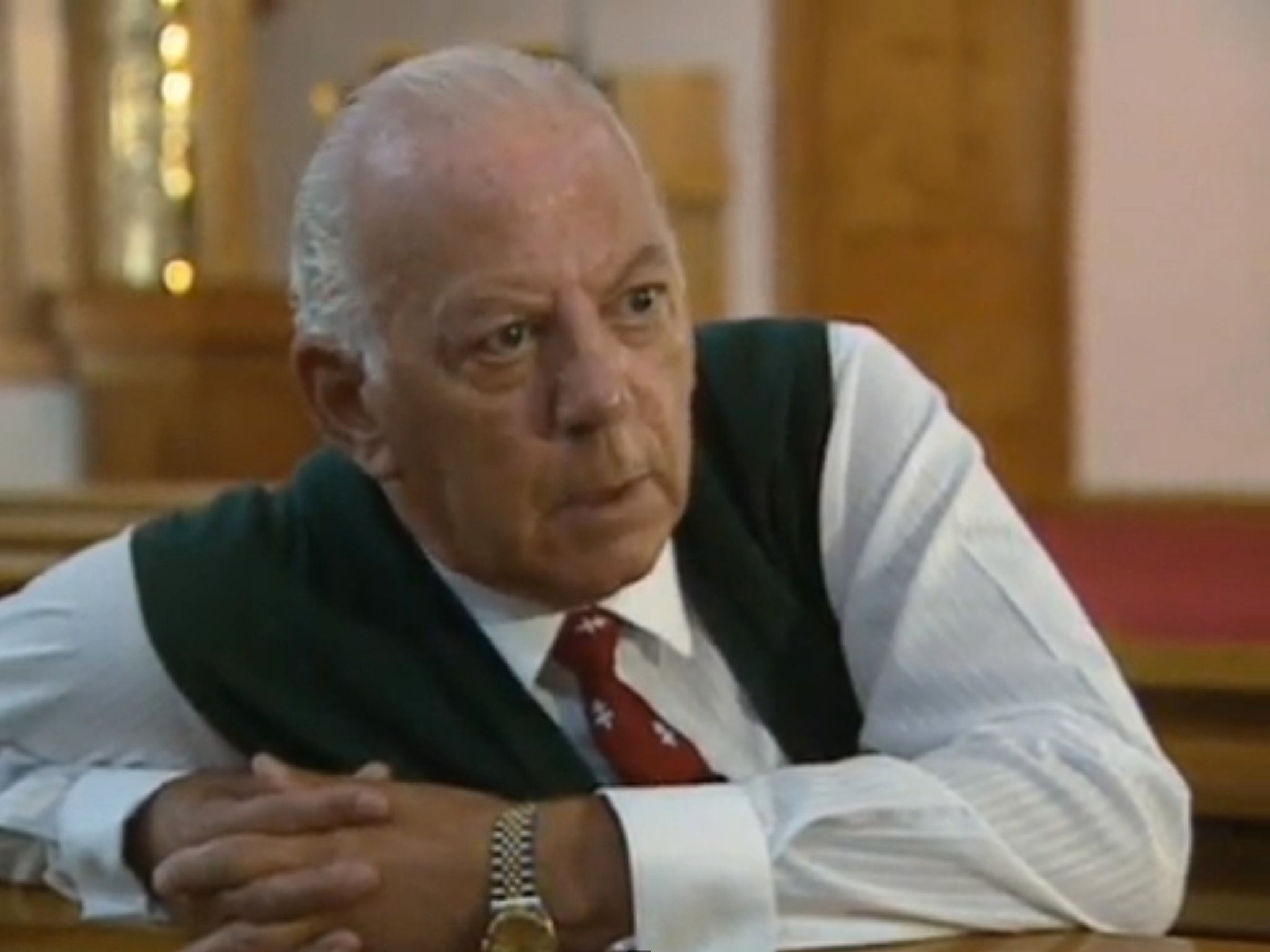Joe Beltrami: Barrister and former criminal defence lawyer who saved a dozen men from the gallows
He defended more than 350 accused murderers, winning more often than not, and he was never from the headlines, not least when he defended a grizzly bear

Your support helps us to tell the story
From reproductive rights to climate change to Big Tech, The Independent is on the ground when the story is developing. Whether it's investigating the financials of Elon Musk's pro-Trump PAC or producing our latest documentary, 'The A Word', which shines a light on the American women fighting for reproductive rights, we know how important it is to parse out the facts from the messaging.
At such a critical moment in US history, we need reporters on the ground. Your donation allows us to keep sending journalists to speak to both sides of the story.
The Independent is trusted by Americans across the entire political spectrum. And unlike many other quality news outlets, we choose not to lock Americans out of our reporting and analysis with paywalls. We believe quality journalism should be available to everyone, paid for by those who can afford it.
Your support makes all the difference.For most of his 50-year career, Joe Beltrami was Scotland’s most famous criminal defence lawyer, saving a dozen murder convicts from the gallows before the death penalty was abolished in 1965, and helping many more high-profile potential “lifers” walk free thereafter, including Glasgow mafiosi, bank robbers and safecrackers. In all, he defended more than 350 accused murderers, winning more often than not, and he was never from the headlines, not least when he defended a grizzly bear in a case centred in the Outer Hebrides.
The cry “Get me Beltrami,” rather than “get me a lawyer,” went from being the first three words of many an arrested criminal to a phrase used in Glasgow streets and even school playgrounds whenever someone was jokingly accused of something. His achievements and fame were all the more remarkable as the son of an Italian-speaking immigrant from southern Switzerland who ran a fish and chip shop.
The finale to his long, colourful and controversial career was being made an honorary life member of the Law Society of Scotland in 2009, the year after he retired at 76. He had won the only two royal pardons granted in Scotland during the 20th century, both in the 1970s. One was for convicted murderer Paddy Meehan, who was serving a life sentence, the other for Maurice Swanson, who had been jailed, wrongly as it turned out, for robbing a bank.
Between starting his own practice in 1958 and the abolition of the death penalty seven years later, he successfully defended no less than 12 capital murder cases, leading The Glasgow Herald to run the headline “Beltrami 12 – Hangman 0”. Beltrami had long opposed the death penalty, saying: “there have been miscarriages of justice where innocents have been executed and that is too high a price to pay ... I had nightmares about clients being led to the gallows ... It’s very gruelling and difficult to know a man’s life is in your hands.”
Among Beltrami’s most famous clients were the self-styled “Glasgow godfather” Arthur Thompson, murderer Jimmy Boyle, safecracker Johnny Ramensky, and Walter Scott Ellis, who had been accused of killing a taxi driver in 1961. Thompson, like Beltrami always immaculately dressed, got Beltrami and his wife Delia ringside seats and VIP treatment at the Muhammad Ali-Joe Bugner bout in Las Vegas in 1973. Thompson was known in the Glasgow underworld for allegedly ordering his enemies to be nailed to the floor, an idea that he may have got from Monty Python’s famous Piranha brothers’ sketch.
Beltrami’s Italian surname and social appearances with his clients often raised eyebrows, but according to his peers on both the defence and prosecution sides, the innuendos resulted from the fact that he developed a relationship of trust with his clients. “Big Joe”, his peers agreed, was zealous in his role as a defender.
One of his less grisly cases was defending a grizzly bear called Hercules. The domesticated bear, who appeared in TV ads and the James Bond film Octopussy, was raised as a pet by a couple, Andy and Maggie Robin, in a remote area near Dunblane, but went missing in 1980 while shooting a “Big Softy” ad for Kleenex on the Outer Hebridean island of Benbecula.

The bear was found safely after 24 days, half-starved after declining to eat the island’s cattle, sheep or wildlife, but Robin was prosecuted for “failing to control a wild animal”. In court, to laughter, Beltrami insisted on an identity parade of Hercules and five other grizzlies in front of witnesses and 40 policemen for security. It was not necessary. When he proved that Hercules was a “working bear, not a wild animal”, the case was dropped.
Beltrami was a lifelong Celtic fan and maintained close relations with players and club for more than 50 years. He was in manager Jock Stein’s Lisbon hotel room in 1967, celebrating having won the European Cup, when the by-then engraved trophy was delivered to the hotel room in a tied-up box which Beltrami opened: “I was the only one with a pen-knife.”
Joseph Beltrami was born in Rutherglen, on the outskirts of Glasgow, on Whitsunday 1932, to Giuseppe Beltrami, from the Italian-speaking canton of Ticino in Switzerland, who had moved to Glasgow and opened a fish and chip shop in Glasgow Cross, in the old heart of the city. Brought up mostly in the Briggait (Bridgegate) area by the Clyde, famous for its fish market, he attended the Jesuit St Aloysius’ College before going to the University of Glasgow to study law. He did his National Service from 1954-56 as a sergeant in the Intelligence Corps, mainly as a military interpreter in Paris. On guard duty, he once resolutely refused to let Earl Mountbatten into a meeting because he had forgotten his security pass. The Earl had to send his valet back to his hotel to get it.
Graduating in 1953 and qualifying as a solicitor in 1956, he became an apprentice lawyer for £6 a week. He set up his own firm, Beltrami & Company, in 1958, on Buchanan Street, central Glasgow, the same year he married fellow Glaswegian Bridget Fallon, who changed her Christian name to Delia.
The couple were on honeymoon in Ireland that year when he heard that suspected serial killer Peter Manuel had been arrested in Scotland. Although not involved, Beltrami made a point of getting into the public gallery at Glasgow High Court, knowing it could be “the murder trial of the century.” Manuel went to the gallows in Barlinnie prison in July 1958 but the intricacies of the trial fascinated Beltrami and strongly influenced his court technique.
In court, he often faced such lawyers as Sir Ming Campbell and John Smith, later leader of the Labour party. He wrote several books including The Defender, Tales of the Suspected and A Deadly Innocence. His three sons followed in his footsteps: Edwin is Director of the Crown Prosecution Service for North Wales, Adrian Beltrami is a barrister based in Gray’s Inn, and Jason, like his father, went into criminal law.
“With his bellowing Johnny Cash-like voice that resounded around the court, Joe was always an imposing presence,” Gary McAteer, current managing director of Beltrami & Company, told The Independent. “When he interviewed me for my first job, when I was 20, it was more like a cross-examination.”
Joseph Beltrami, lawyer: born Rutherglen, South Lanarkshire, 15 May 1932; married Bridget (Delia) Fallon (three sons); died Bothwell, South Lanarkshire 23 February 2015.
Join our commenting forum
Join thought-provoking conversations, follow other Independent readers and see their replies
Comments